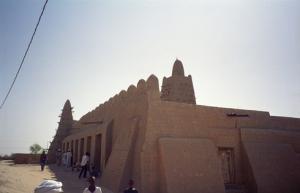Cultural terrorismMali Islamist will plead guilty in ICC to cultural-destruction war crime
Ahmad al-Faqi al-Mahdi, a jihadist from Mali, has pleaded guilty to destroying ancient world-heritage Islamic sites in Mali. The destruction took place during the short 2012-2-13 reign of the Islamist Ansar Dine movement in break-away northern Mali, which the group called Azawad. Mahdi is he first person to face cultural destruction-related war crimes charges before the International Criminal Court (ICC).

The thirteen-century Djinguereber Mosque, where Ansar Dine destroyed two tombs of muslim saints // Source: wikipedia.org
Ahmad al-Faqi al-Mahdi, a jihadist from Mali, has pleaded guilty to destroying ancient world-heritage Islamic sites in Mali. The destruction took place during the short 2012-2-13 reign of the Islamist Ansar Dine movement in break-away northern Mali, which the group called Azawad. Mahdi asked for forgiveness from the Mali people. TVC News reports that Mahdi is he first person to face cultural destruction-related war crimes charges before the International Criminal Court (ICC).
He was charged with ordering the Islamist militants under his command to destroy nine mausoleums and a section of Timbuktu’s famous Sidi Yahia mosque, UNESCO world-heritage sites going back to the fifteenth and sixteenth centuries.
His lawyer said Mahdi had told him that he was “a Muslim who believes in justice.”
“He wants to be truthful to himself and he wants to admit the acts that he has committed. And he wants to ask at the same time for pardon from the people of Timbuktu and the Malian people,” Aouini told a hearing at the ICC on Tuesday.
“He regrets all the actions that he has committed,” Aouini added.
Aouini said Mahdi will admit to a single charge of “the war crime of attacking buildings dedicated to religion and historic monuments” in 2012.
Legal analysts note that Mahdi’s prosecution comes at a time when ISIS has made it a practice to destroy important archeological sites in the areas under the group’s control.
The trial was planned for mid-June, but both the defense and prosecutors have asked the judge to postpone the opening of the trial to 25 August.
Judge Raul Pangalangan said the judges were “willing to accommodate a request” to start the trial after the Muslim festival of Eid al-Fitr, which ends the fasting month of Ramadan in early July, adding: “However, the chamber emphasizes that this trial needs to proceed expeditiously.”
